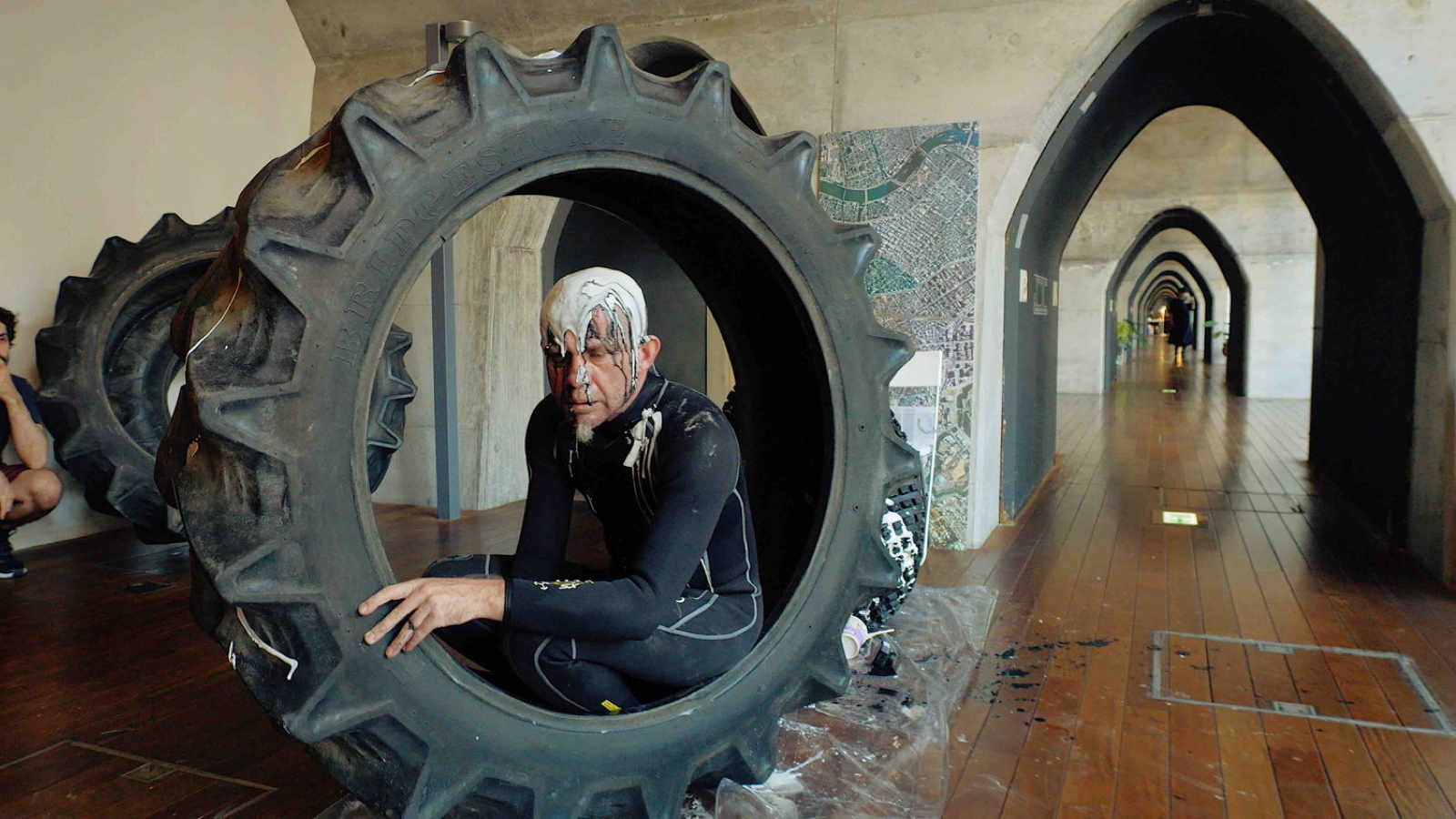

[Social Dive Projects] Michael Hornblow: Why is the River Laughing?

Area
K
Kanda・Yushima
JAPAN ART BRIDGE, mAAch ecute Kanda Manseibashi
Outline
“Why is the river laughing?”…takes a SOCIAL DIVE into Tokyo by diving into the river city.
Artist-researcher Michael Hornblow from New Zealand, performs a retracing of Tokyo waterscapes as a way of imagining alternate histories and futures. The Sotobori area is a key focus, where the old moat system finds a spiraling movement into the Imperial Palace – a feature of the city going back to when waterways defined the Edo period as a Floating World. The project is a dive into history, drawing out the man-made construction of Tokyo’s rivers as they reflect the changing course of political and natural forces. It is also a dive into the social and urban fabric of today, re:linking the river by rolling water through the streets inside a fleet of old tires. Tracing ghost moats and lost canals, the tires act as conceptual apparatus for revealing where roads and flyovers obscure the historical and ecological importance of local tributaries. The construction of nature is always at play in urban river systems, and now we find ourselves at a convergence – what we make of us, and other beings.
Supported by The Center for Philosophical Technologies at Arizona State University, The School of Global Studies at Thammasat University, The University of Tasmania, The University of New South Wales
Collaborators:Yugo Hattori, Tim Budgen, Michael Porter, Gabriel Camelin, Matthew Gingold, Jean David Caillouët, Stephen Loo, Hidenobu Jinnai, Keiko Torigoe, Norihisa Minagawa, Julian Worrall, Stephen Loo, Adam Nocek
For further details & updates see:
michaelhornblow.com/whyistheriverlaughing
SOCIAL DIVE: Artist-in-Residence Projects
For the SOCIAL DIVE Artist in Residence Projects, an open call program that was held in the previous Tokyo Biennale 2020/2021, twelve overseas artists were selected from over 1,535 applications. However, the projects of seven of those artists were postponed due to the effects of the coronavirus.For Tokyo Biennale 2023, we plan to invite the artists who were unable to come to Japan to present their works. The artists will “dive” into various areas of the Tokyo cityscape, observe the charm of people who live and gather there, and generate new values. While interacting with society, the artists will come to reveal various connections latent in the city. These connections may offer unexpected perspectives for those who live and work in Japan today, or viewpoints that are all too familiar for its inhabitants to notice.
The project is based at Japan Art Bridge in the historic viaduct renovation of mAAch ecute in Manseibashi, where there is an Exhibition with video art, mapping studies, live painting, sculptural installation, and as an Open Studio for the artistic team to work and interact with visitors. There is a series of events in the gallery – Performances, Workshops, a Symposium – as well as Sotobori Walks and Street Actions around the outer moat system. Please join us, especially if you have stories, knowledge or interest about waterscapes in the Sotobori area – or out and beyond Tokyo, including international and planetary perspectives.
| September 18 – October 30 | Artist stays in Tokyo for production |
| September 23 – November 5 | Exhibition of results |
| September 24, 14:00–17:00 | Performance |
| September 30, 18::30–19:30 | Performance + Sound art |
| October 04, 14:00–16:00 | Street Action |
| October 07, 11:00–14:00 | Dance Workshop |
| October 08, 13:30–15:00 | Sotobori Walk |
| October 13, 15:00–17:00 | Street Action |
| October 14, 11:00–14:00 | Mapping Workshop + Sotobori Walk |
| October 15, 16:00–19:30 | Symposium + Performance |
| October 16/19, 18:30-19:30 | Special Showing |
Artists・Members